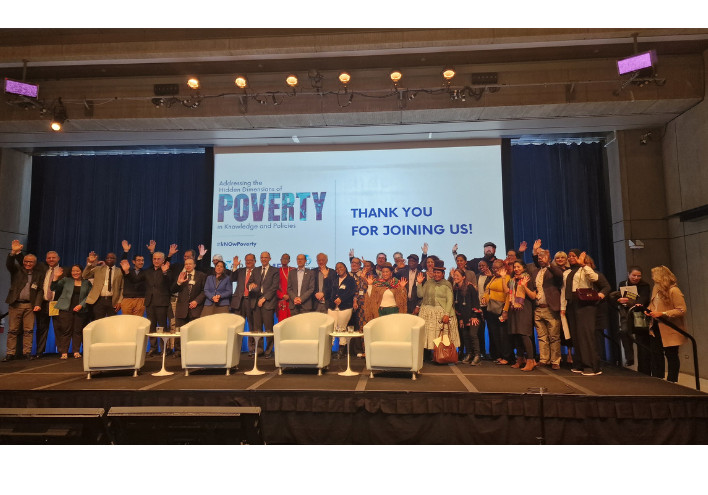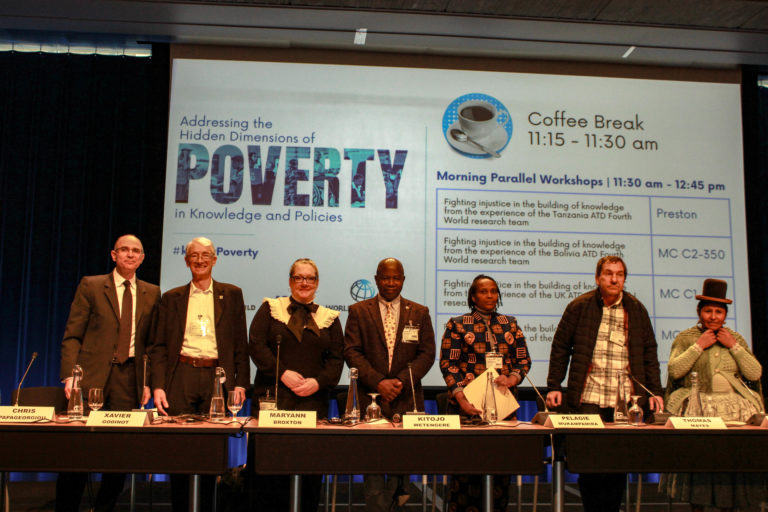The World Bank and the IMF Address the Hidden Dimensions of Poverty in Knowledge and Policies

On February 15, 2024, ATD Fourth World delegates from Bolivia, Tanzania, the United Kingdom, and the United States gathered at the World Bank headquarters in Washington DC (watch video recording), to bear witness to the urgent need to rethink policies that aim to eliminate poverty. The delegates are members of the ATD Fourth World national teams that took part in the “The Hidden Dimensions of Poverty” research project in close collaboration with the University of Oxford.
“What do we really know about poverty? Poverty goes much deeper than just an income level.”
With those introductory words, Maryann Broxton, an ATD Fourth World activist from the United States, addressed the conference attendees. She began the ATD delegates’ presentation of the findings of the Hidden Dimension of Poverty research project. Among those listening were experts from the World Bank and the International Monetary Fund (IMF). Maryann pointed to how ill-conceived public policies often are, and, “what’s even worse – she said – is when policies are determined by numbers on a spreadsheet, without never having a meaningful conversation with the real experts: the people that experience poverty every day.”
Throughout the morning, contributions from academics, practitioners, and people with lived experience of poverty came together to reinforce that view. In Tanzania, Bolivia, and the United Kingdom, the conclusions were the same: poverty brings a loss of dignity and respect, the contributions made by individuals living in poverty frequently remain unacknowledged, perpetuating feelings of disempowerment.

Esther Duflo — the Abdul Latif Jameel Professor of Poverty Alleviation and Development Economics at Massachusetts Institute of Technology, a Nobel Prize Laureate in Economic Sciences, and a holder of the Poverty and Public Policy Chair at the Collège de France — delivered the conference opening address. In a video link from Paris, Duflo began by stating her “great respect for ATD Fourth World.” Then, with graphics in support, she advocated for the need to “change the discourse on poverty to reimagine social policy,” although recognized that “political support is lacking…”
Duflo’s words were unforgiving: “inequalities have been rising in the world because poverty reduction programs have not involved the direct beneficiaries of those policies.” For Duflo, there is no alternative. Public policies aimed at eliminating poverty must be based on:
- “autonomy, respect, and agency”, to avoid conditional programs that are very costly to enforce and lead to the exclusion of the poorest and most vulnerable people;
- “trust”, to combat stereotypes that social protection make people lazy, or that beneficiaries may try to cheat the system; and
- “inclusion”, as poor people are often excluded from targeted government programs they are entitled to.
People in poverty as agents of change
During questions, international experts acknowledged the shortfalls of the macro-economic logic that guides policy creation. But, as one the World Bank researcher put it, “it is difficult to find suitable indicators that will allow us to properly reflect and evaluate the many dimensions of poverty.” In response, Duflo pointed to the need for a better dialogue with the people affected during policy design processes.
The IMF and the World Bank cannot escape their responsibility for past policy failures: “I am struck by the number of mistakes we could have avoided if we had included [people in poverty] in the design of policies from the very beginning, stated Olivier De Schutter, the United Nations Special Rapporteur on Extreme Poverty and Human Rights.
“It may look time consuming and costly to involve people directly affected, but the rewards are huge if we do this properly”. “Participation, he added, is not only about providing information or consulting, it is also about sharing power: co-deciding solutions.”
Martin Kalisa, the Deputy Director of ATD Fourth World, emphasized that we cannot afford to waste any more time. He urged the international financial institutions present to change course, stating that they “need sound foundations to design policies that effectively eliminate poverty,“ and that requires “assessing poverty in all its hidden and complex dimensions.” To this end, Kalisa announced his expectation of concrete commitments from the IMF and World Bank. This message was heard by the professionals of the World Bank and the IMF. Ceyla Pazarbasioglu, the Director, of the Strategy Policy and Review Department, at the IMF, acknowledged the challenge in her concluding remarks : “we must address this challenge: we have no other choice but to launch a pilot project if we are to tackle the many different scourges that most affect the poorest.” The first concrete result from this conference is therefore as follows: the World Bank has asked ATD Fourth World to come up with an appropriate training program in the Merging of Knowledge approach for the WB research project staff.
A new tool for the inclusive and deliberative elaboration and evaluation of policies
Xavier Godinot, Research Director at ATD Fourth World, and Olivier De Schutter presented a tool for the evaluation of policies. The tool, co-designed by a group of practitioners, experts from different institutions, and people with direct experience of poverty, was created using the Merging of Knowledge approach and was based on the assessment of the Basic Income Support scheme in France. It is the “Inclusive and Deliberative Elaboration and Evaluation of Policies (IDEEP)” tool. Godinot explains:
“With this tool, we aim to translate into action the findings of the international research project on the Hidden Dimensions of Poverty, carried out from 2016 to 2019 with the University of Oxford. This tool is not intended to replace existing instruments, but to supplement them.”
For ATD Fourth World, policies targeting people in poverty must be designed and assessed with them. “A simple consultation process is insufficient”, said Godinot: “The approach must be inclusive and deliberative[…].” “This tool must now be tested by the public institutions, but also by the NGOs. It must help us embed the results of the research on the Hidden Dimensions of Poverty into concrete projects.”
The ball is now firmly in the camp of the international financial institutions. They must work to co-create pilot projects and implement this new instrument in support of their stated objective of making true a world free from all forms of poverty.

